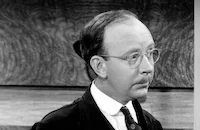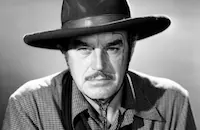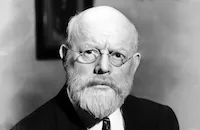Jackass Mail

Brief Synopsis
Cast & Crew
Norman Z. Mcleod
Wallace Beery
Marjorie Main
J. Carroll Naish
Darryl Hickman
William Haade
Film Details
Technical Specs

Synopsis
In a small California town, Just Baggott enters a saloon and meets bartender Signor O'Sullivan, an Italian-Irishman born in Monterey, and boasts of having a map to a huge gold mine. Some angry men then enter the saloon and accuse Baggott of being a horse thief. With Signor's help, Baggott escapes, but later, Signor steals the map, only to discover that the illiterate Baggott didn't know that it was really a Chinese laundry list. The two then decide to become partners and rob the "Jackass Mail" wagon transporting thousands of dollars in gold to Sacramento. As they observe the wagon, owner Clementine "Tiny" Tucker and her driver, Hickory Jake, are attacked by bandits Jim Swade and Red Gargan, who shoot and kill Hickory, but are chased away by Baggott. Tiny is suspicious of Baggott, but lets him drive the wagon. When they stop, he ties her up, but is so smitten with her that when she suggests that they steal the gold together, he unties her. She then pulls a gun on him and reveals that there was no gold on the wagon. She is tempted to send him away, but has a change of heart and tells him to keep on as her driver so that she can make an honest man out of him. One of their mail deliveries is to young Tommy Gargan. Baggott is touched by the boy and lets him have his package, a watch, without paying the money owed. When Red comes home, Baggott recognizes him as one of the thieves, but says nothing. In Gold Camp, Baggott is shocked to learn that Tiny owns the saloon and entertains in a skimpy costume, and she chastises him for his drinking. When Red and Swade arrive at the saloon, Tiny reveals that Red was supposed to be her driver but was fired over his association with Swade, whom Baggott knows killed Hickory. When Baggott confronts them, they draw their guns, but Baggott outdraws them and kills Red. Swade escapes and Tiny makes everyone promise not to let Tommy know how Red died. The next day, when Tommy says he wants to live with Baggott, Tiny thinks it is a good idea and suggests that they ride the mail together. Soon, inspired by the adoring Tommy, Baggott gives up drinking and allows Tiny to hold his salary for him. Tiny then uses her money and his to help finance a railroad stop for the town. While Baggott broods about Tiny using his money, Signor suggests that they steal the next day's mail, which will contain thousands of dollars of the town's railroad money. The following day, a masked Swade holds up the wagon, but Baggott, thinking that he is really Signor, cooperates. Tommy, whom Baggott has taught how to shoot, wings Swade, who drops the strong box while escaping, but wounds the boy. After Baggott takes Tommy to a doctor, he admits how much he likes the boy and even promises to give up drinking if Tommy gets well. Soon Tiny and a recovered Tommy take Baggott to a temperance meeting, at which she announces that she is closing the saloon. Although he drops a liquor bottle that Signor planted on him, Baggott swears that he has not taken a drink and would never lie to Tommy. Baggott later threatens Signor and warns him never to tell Tommy who shot Red. One day, after Baggott breaks a guitar over Signor's head, thinking that he is romancing Tiny, he plays faro at the saloon and bets $5,000 in winnings on one card. Although disappointed, Tiny takes the bet and Baggott wins. He then says that if he wins again, he wants her to marry him, and she happily accepts his proposal when he wins. One month later, the town, which is now called Baggott City and has both a church and a school, awaits the train. Baggott and Signor insist on riding triumphantly into town on the detached engine but they don't know how to stop it and it crashes, spewing out liquor bottles that have been hidden in boxes marked "hymn books." Although only Signor is responsible, Tommy thinks Baggott has lied to him and Tiny says she cannot marry a man she cannot trust. That night, Baggott plans to leave with Signor and Tommy. When Tommy says he doesn't want to go, Baggott mistakenly thinks that Signor has told him about his father's death and inadvertently reveals the truth. The heartbroken boy draws a gun on him, but leaves. Meanwhile, Swade and his gang are planning another robbery and Tommy, who is riding by, overhears it. The next day, as Tiny and other townswomen ride the train toward Sacramento, Baggott and Signor ride on top as part of their own robbery plan. When Swade and his gang stop and board the train, the women refuse to cooperate and Signor and Baggott fight Swade's men off. Just then, vigilantes, who have been warned by Tommy, arrive at the train, and everyone assumes that Signor and Baggott were secretly guarding the train all along. Baggott meanwhile goes after and captures Swade, and when the townspeople arrive, they declare Baggott a hero. Tommy and Tiny are very proud and she demands that Baggott marry her.

Director

Norman Z. Mcleod
Cast

Wallace Beery

Marjorie Main

J. Carroll Naish

Darryl Hickman
William Haade
Dick Curtis

Hobart Cavanaugh

Joe Yule
Harry Fleischmann
Louis Mason
George Carleton
Bobby Larson
Mary Currier

Harry Woods
Paul Newlan
Duke York
Murdock Macquarrie
Joe Whitehead
Esther Howard
Babe London
Edward Hearn
Eddie Hart
Al Ferguson
Art Belasco
Robert Perry

Howard Mitchell
Frank Darien
Malcolm White
Ruth Warren
Wade Boteler
Jane Goude
Harry Worth
Robert E. O'connor
Billy Wayne
Charles R. Dorety
Ted Oliver
Jack Kenney
Bobby Barber
Leroy Mason
Crew
Tom Andre
Earl Brent
Earl Brent
John W. Considine Jr.
Clyde De Vinna
Cedric Gibbons
Lawrence Hazard
Lionel Houser
Sammy Lee
Jay Marchant
Gene Ruggiero
Douglas Shearer
Shoup
David Snell
Gile Steele
C. Gardner Sullivan
Leonid Vasian
Edwin B. Willis

Film Details
Technical Specs

Articles
Jackass Mail
By Richard Harland Smith

Jackass Mail
Quotes
Trivia
Notes
The film is framed by a modern day prologue and epiloque in which a young boy wonders why the town is named after his grandfather, whom he heard had been a horse thief. An early pre-production news item names Edward Woehler as the film's assistant director, but he is not mentioned in any other source. According to Hollywood Reporter news items, backgrounds and exteriors for the film were shot on location at Keene Camp in the San Jacinto Mountains, Calabasas, Idyllwild and Chatsworth, CA. Additional exteriors were shot near Tucson, AZ. News items indicate that principal cast members May only have been used at the Chatsworth location. A Hollywood Reporter news item on May 12, 1942 mentioned that Wallace Beery was to return to work in two weeks to shoot added scenes, but no other information about additional scenes has been located.
The following actors were mentioned in news items as being cast in the production, but their appearance in the released film has not been confirmed: Eddie Dunn, Alice LaMont, Margaret Burns, Marie Day, Renee Evans, Sydney Logan, Gladys Roach, Alma Fern and Fred Oliver.















